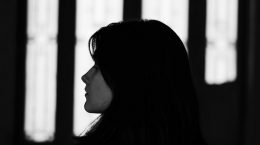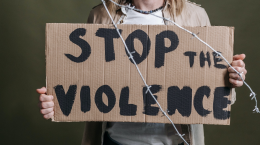Until a year ago, Orsha native Natalia Hershe did not know that she would not soon see her loved ones living in Switzerland. After the elections, the woman returned to her homeland, took part in the march, where she tore off the balaclava from the riot policeman. For this she was sentenced to 2.5 years in prison. Now Natalia is not only a resident of St. Gallen, wife, sister and mother, but also a political prisoner.
Life before the protests
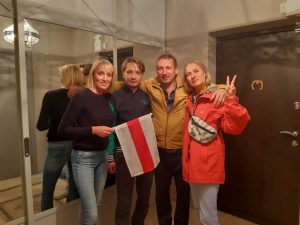 Natalia Hersche has been living in Switzerland for the past 12 years. She studied at the Orsha Technological College, then graduated from the Belarusian State Economic University, worked as an accountant in the social protection department of Orsha District Executive Committee and married her countryman. However, she always wanted to go abroad and provide a better life for her children.
Natalia Hersche has been living in Switzerland for the past 12 years. She studied at the Orsha Technological College, then graduated from the Belarusian State Economic University, worked as an accountant in the social protection department of Orsha District Executive Committee and married her countryman. However, she always wanted to go abroad and provide a better life for her children.
The marriage did not work out, and after the divorce, Natalia began to learn German. Then she married a Swiss, whom she met on a dating site, and left with him and two children from her first marriage to his homeland. She started out as a technical worker in a brewery where, after a few months, the director of the brewery asked about her education and transferred her to the quality control laboratory.
Later, Natalia worked at a tableware company, and now holds a high position in a private company. In addition to work, she was engaged in drawing, even went to courses in St. Petersburg. Her salary allowed to support herself. Natalia said more than once that she was shocked that she could buy herself a car on one salary.
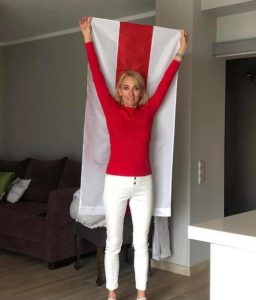 All these years, the woman did not forget her homeland and considered herself a patriot of Belarus. She didn’t even give up her Belarusian passport. She was constantly in touch with her brother Gennady, often visiting Belarus, bringing her nephews children’s clothes, and after the elections she actively followed the events in her home country. On her vacation in September, Natalya flew to Belarus, exchanging warm lands for the country where she lived most of her life. Here she immediately began to actively take part in peaceful rallies. In Switzerland, Natalia is expected by her husband Robert Shteeli, son Fedor and daughter Violetta.[1]
All these years, the woman did not forget her homeland and considered herself a patriot of Belarus. She didn’t even give up her Belarusian passport. She was constantly in touch with her brother Gennady, often visiting Belarus, bringing her nephews children’s clothes, and after the elections she actively followed the events in her home country. On her vacation in September, Natalya flew to Belarus, exchanging warm lands for the country where she lived most of her life. Here she immediately began to actively take part in peaceful rallies. In Switzerland, Natalia is expected by her husband Robert Shteeli, son Fedor and daughter Violetta.[1]
On the day of detention
On September 19, Natalia Hershe went to the Social pedagogical centre with a shelter of the Frunzensky District to support activist Elena Lazarchik from whom they wanted to take away her son because of her civil position.
“Natasha called me filled with positive emotions. She said it was impossible not to be happy for the woman. Thanks to the people, the boy is with his mother again”, Natalia’s brother Gennady later recalled.
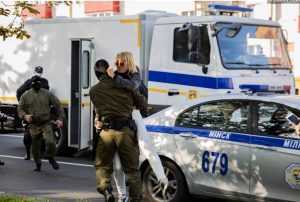 During the conversation, Natalia said that she would go on a march to the Komarovsky market. Gennady, as he was in Molodechno, was following it online – he saw his sister on the stream immediately. The moment when she pulled off the balaclava from the riot policeman also got into the frame, but the man did not pay attention to it. After the arrest, Natalia managed to call her brother and say that she had been detained. He told her not to worry – he hoped his sister would be released after the report was drawn up.
During the conversation, Natalia said that she would go on a march to the Komarovsky market. Gennady, as he was in Molodechno, was following it online – he saw his sister on the stream immediately. The moment when she pulled off the balaclava from the riot policeman also got into the frame, but the man did not pay attention to it. After the arrest, Natalia managed to call her brother and say that she had been detained. He told her not to worry – he hoped his sister would be released after the report was drawn up.
After that, the connection with Natalia Hershe was interrupted. Neither Gennady nor her friend Elena, with whom Natalia lived in Minsk, could get through to her. She was searched for in various police stations, but there was no information about her whereabouts. The relatives of the Belarusian Swiss woman spent the rest of the night in the dark.
Late in the evening of the same day, Gennady’s children found Natalia in the list of detainees, which was published by the Viasna human rights center, which had been deprived of registration. It said that the woman was taken to Akrestsina.[2]
Natalia’s brother contacted the Swiss embassy in Belarus, then found a lawyer for his sister. The defender Galina Melnichenok managed to find out that the administrative process had already taken place without her: Hershe was given 15 days under Article 23.34 of the Administrative Code. However, that was not all. Natalia was then charged under Article 363 of the Criminal Code (resisting an internal affairs officer or other person guarding public order). Before the trial, the woman was transferred to a pre-trial detention center in the city of Zhodzina, then to pre-trial detention center No1.
The trial of Natalia Hershe
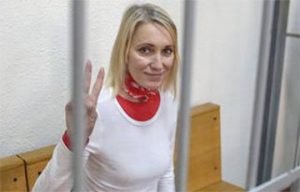 The Belarusian Swiss woman was put on trial on December 3. Natalya was charged with failing to comply with the officers’ request to enter a special vehicle and attempting to flee. When she was intercepted by Sergei Konchik, 22, a riot police officer, she deliberately resisted with violence: she lashed out and resisted, then grabbed and scratched Konchik’s face, pulled off her balaclava, thereby ruining her uniform and inflicting bodily injury.
The Belarusian Swiss woman was put on trial on December 3. Natalya was charged with failing to comply with the officers’ request to enter a special vehicle and attempting to flee. When she was intercepted by Sergei Konchik, 22, a riot police officer, she deliberately resisted with violence: she lashed out and resisted, then grabbed and scratched Konchik’s face, pulled off her balaclava, thereby ruining her uniform and inflicting bodily injury.
Natalya did not admit her guilt and asked to look at the injured riot policeman, who was wearing a medical mask in the courtroom. The court rejected the request. In addition, Natalia said she tried to escape because she remembered the deaths in Belarus and was certain she would be one of the victims if she got into a police van.
“When I was a few steps from the car, the idea spontaneously came to me that if I look a person in the eyes, no matter how funny it sounds, he will take pity on me and let me go. I turned to him and made an attempt to remove the balaclava. It was not my intention to inflict physical pain on him, ” Natalia recalled at the trial.
Sergei Konchik wrote a statement of claim against Natalia Hershe and asked for 100 rubles in moral compensation. In the courtroom, he noted that he would like to increase the compensation to 1000 rubles, which he wants to donate to the Centre for Pediatric Oncology, Hematology and Immunology.
The defendant’s lawyer demanded additional materials, but the court refused her. They did not attach to the case the conclusion of the forensic medical examination describes the injuries received by Konchik, and photographs of the injuries. Witness Yuri Petrov, the victim’s supervisor, described very different injuries to him, and the words did not match Konchik’s, but the contradictions went unnoticed. In addition, the lawyer requested that the original medical journal of the MIA hospital describing Konchyk’s injuries be attached to the case file. This was also refused on the grounds that “there are sufficient materials in the criminal case file”.
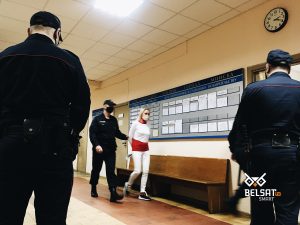 The defender stressed that for 13 years Natalia Hershe has been living in Switzerland, where representatives of the internal affairs bodies dress exclusively in uniforms with identification marks. In addition, the lawyer insisted that in Switzerland it is possible to hold mass events without the permission of the authorities – and for Hersche it was a novelty that in Belarus a permit was needed for a protest. According to the defense lawyer, the investigation tried to hide evidence that did not fit into the evidentiary base.[3]
The defender stressed that for 13 years Natalia Hershe has been living in Switzerland, where representatives of the internal affairs bodies dress exclusively in uniforms with identification marks. In addition, the lawyer insisted that in Switzerland it is possible to hold mass events without the permission of the authorities – and for Hersche it was a novelty that in Belarus a permit was needed for a protest. According to the defense lawyer, the investigation tried to hide evidence that did not fit into the evidentiary base.[3]
The state prosecutor requested 2.5 years of imprisonment for Natalia Hershe. The judge upheld this sentence. Natalia will also have to pay Konchik material compensation for moral damage in the amount of 1,000 rubles, a state fee of 81 rubles, and procedural costs of 11 kopecks. The Swiss woman’s belongings seized during her arrest (mobile phone, Apple Watch) will be under arrest, and her white-red-white flag is ordered to be destroyed.[4]
Natalia Hershe after the trial
On December 23, Natalia Hershe was recognized as a political prisoner, and her persecution was called politically motivated. In a statement from the human rights community, it was pointed out that the activities of the police during the arrest of the protesters on September 19 went beyond fulfilling their duties to protect order, and Natalyia did not commit a criminal offense.[5]
On January 19, Natalya went on a hunger strike in the prison. She protested that she had not received letters since December. Within three days after the hunger strike was announced, she was transferred to a cell with better conditions, 38 letters were handed over, and she was also allowed to speak with the Swiss ambassador. As a result, Natalia ended her hunger strike.[6]
After the trial, Natalya Hershe appealed the verdict. On February 16, the appeal was reviewed. However, the punishment for the Belarusian Swiss remained unchanged. Hershe asked to be allowed to participate in the meeting and undergo a polygraph test. These requests were rejected.[7]
On February 22, Natalia went on a hunger strike again, which ended on March 12. On that day, she was transferred to penal colony No. 4 in Homel. The journey to the colony was 12 hours. “I started to eat, ate one apple, there wasn’t much water, we were saving. On arrival, at first glance, everything looked good, but I felt very weak. We found lunch, it wWe caught lunch, it was very good, although I didn’t eat much,” Natalia said in a letter.[8]
Support from the Swiss authorities and the Belarusian opposition

Claude Altermatt
Since 19 September, Natalia Hersche has been under the radar of the Swiss Embassy in Belarus. The Swiss Ambassador to Belarus Claude Altermatt watched the court hearings and visited Natalia in prison. The first time he was allowed to do so was only a month after the Swiss national had been detained. The “care” package from the ambassador for Natalia was not accepted that time.
On October 20, the deputy of the Swiss parliament Barbara Gysi took patronage over Natalia’s case. Swiss Foreign Minister Ignazio Cassis appealed to Minsk with demands to release Natalia. Also, the Swiss authorities are in constant contact with the Belarusian authorities. In addition, they are concerned about the increase in violence against peaceful demonstrators in Belarus and express regret over the verdict. It is not legally possible to appeal against it.[9] The case of Natalia Hersche is widely covered in the Swiss press, largely thanks to the Belarusian diaspora in Switzerland, which has been holding actions of solidarity with Natalia.
On December 8, the Swiss Federal Department of Foreign Affairs announced that, together with lawyer Natalia Hershe, it will evaluate the next steps.
“Mrs. Hershe will continue to be under consular protection,” the statement said.[10]
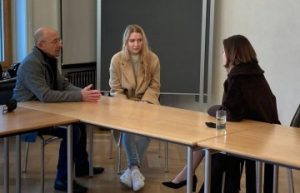 In March, during a visit to Switzerland, Sviatlana Tsikhanouskaya met with Natalia’s family: her husband Robert Shteeli and her daughter Violetta. She promised that she would seek the release of Natalia Hershe and all political prisoners.
In March, during a visit to Switzerland, Sviatlana Tsikhanouskaya met with Natalia’s family: her husband Robert Shteeli and her daughter Violetta. She promised that she would seek the release of Natalia Hershe and all political prisoners.
“Families should not be separated,” she said.[11]
[1]https://nina.nn.by/?c=ar&i=264949&lang=ru
[2]https://lady.tut.by/news/mylife/704767.html
[3]https://spring96.org/ru/news/100766
[4]https://spring96.org/ru/news/100814
[5]https://reform.by/189523-grazhdanka-shvejcarii-natalja-hershe-priznana-politzakljuchennoj
[6]https://svabod1.azureedge.net/a/31063514.html
[7]https://reform.by/202162-prigovor-grazhdanke-shvejcarii-natale-hershe-ostavili-bez-izmenenij
[8]https://euroradio.fm/ru/politzaklyuchennaya-natalya-hershe-prekratila-golodovku
[9]https://www.dw.com/ru/kak-grazhdanka-shvejcarii-okazalas-v-belorusskoj-tjurme-i-chto-tam-uvidela/a-55898182
[10]https://reform.by/185895-shvejcarija-prodolzhit-okazyvat-konsulskuju-zashhitu-natale-hershe
[11]https://reform.by/207734-tihanovskaja-vstretilas-s-semej-natali-hershe




